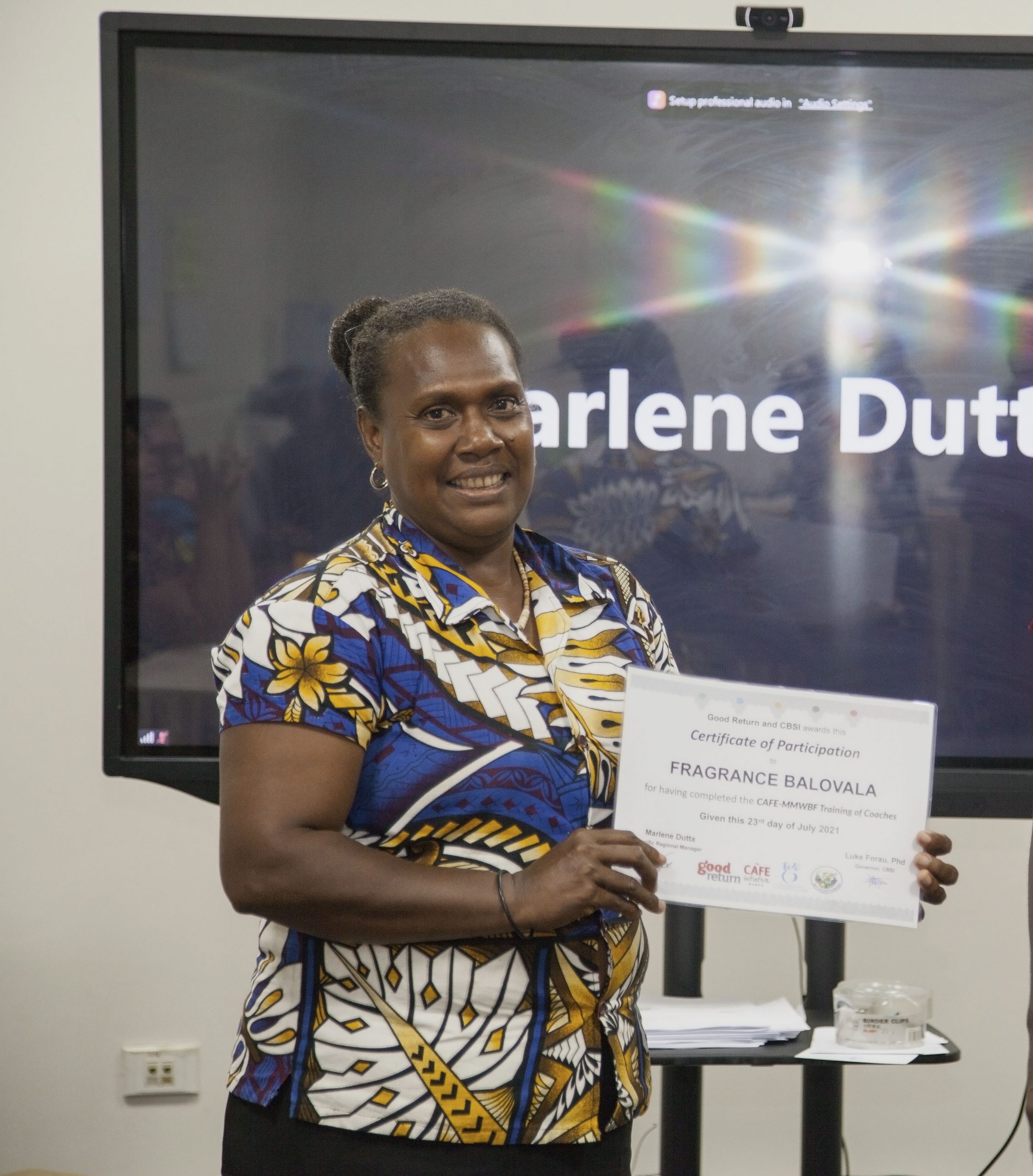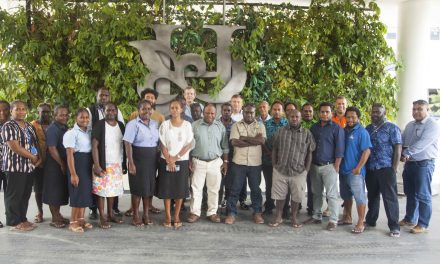Financial Literacy Coaches in the making
By Natasha Eddie
Article No. : 09/2021

Fragrance Balavala from Harabau community in North West Guadalcanal could not hold back the excitement she had after completing the one-week financial literacy training for coaches held at the Heritage Park Hotel on the 19th to 23rd of July 2021.
As the leader of the Vachangisavi Womens Saving Club, this was what she and her group of women needed.
“I am so glad I was selected to attend this one week of training, I have learned a lot, from simple methods of how to save money and to using it wisely. I cannot wait to go home and share these skills and ideas to the women in my community,” she said.
Balavala a representative from the Sahalu ward in North West Guadalcanal was among sixteen of the participants who attended the Financial Capability Coaching Program – Training of Coaches (ToC)
“A lot of us women in my community use money unwisely, we don’t have a budget, we use our money to pay things that we don’t need but want,” she commented.
Balavala said that most of the women in her community did not know how to save their earnings, or even know how to open an account or are aware about other financial products except for the loan products offered by the South Pacific Business Development Programme (SPBD).
“I don’t remember if any women in my community has saved their money in the commercial banks. A lot of us don’t feel like there’s a need to, since we thought its only for those with formal jobs. Most of us earn our money through our marketable products,” she said.
Balavala said they only had the idea to use saving clubs to act as a financial service for women in the community.
The one-week training was facilitated by the Central Bank of Solomon Islands (CBSI) in partnership with Good Return Australia (World Education Australia Limited). The training was a combination of face to face and online sessions.
CBSI Financial Inclusion Analyst, Mrs Freda Diau, who facilitated the face to face training onsite along with Good Return Programme Coordinator, Mrs Elizabeth Sodu, explained the objectives of the training and what participants are required to do upon completing the modules.
“The objective of this financial behavioural competency training is to teach participants to be financial literacy Coaches at which they get to experience financial coaching and learn how to use the accompanying money tools to deliver their training.”
“To change a behavior, you have to do things over and over, maybe 21 times to develop the right behavior. So, this training focuses more on developing the right behaviors to deal with money, and provide participants what we call the money tools to make wise decisions when using money,” she said.
Mrs Diau said by the end of the one-week training, the Coaches are required to roll out a 7 weeks training. A one-hour session is to be held any day in a week. Each Coach is to conduct a training to a group of 10 participants.
“Seven weeks is enough to enable participants to be financially aware of money, and its impact. The change of behavior towards money will follow through as they increase their awareness and practice what they learned,” she said.
Mrs Elizabath Sodu, said Good Return under the CAFÉ (Consumer Awareness Financial Education/Empowerment) initiative is happy to partner up with Central Bank to deliver the Training of Coaches programme.
“Good Return is happy to work with CBSI to deliver the training of Coaches programme. CBSI has an established network of stakeholders that we can work with to assist us in identifying participants for the training.”
The first 16 participants who attended this training were selected from their provincial wards within Honiara and Guadalcanal constituencies. The CBSI have worked with the Ministry of Women, Youth, Children and Family Affairs (MWYCFA) through their women desk officers to identify the participants.
Mrs Sodu said she look forward to go out in other provinces to deliver the training.
“This financial coaching program is exciting, because the coaches that attend this training are influential in their own areas. I believe it will affect the level of financial literacy in their community,” she commended.”
According to Manager Financial Inclusion Unit for Central Bank of Solomon Islands, Linda Folia, Under the Solomon Islands National Financial Inclusion Strategy 3, 2021-2025, Objective 3 is “to develop and disseminate digital and financial literacy programs for women, youth and rural families”.
“One of the activities is to deliver the Training of Coaches programme under the theme “Mekem Selen Waka fo Gudfala Future” covering all constituencies by 2025.”
The NFIS 3 has set two national goals to be met by 2025; to increase active users of financial accounts from 283,954 to 400,000 – of which 50 percent would be women and to increase the number of access points from 825 to 1155.
“This training programme will help people in communities to be competent in financial areas and give them the knowledge on financial information,” Mrs Folia said in her final remarks during the handing over of certificates.
The Financial Inclusion Strategy vision for the next 5 years is to ensure all Solomon Islanders have access to a range of quality and affordable financial services and products and be competent to use them to increase their resilience and improve their livelihood within the growing digital economy.
The second Financial Competency Training of Coaches is scheduled for September this year 2021.
The End//


